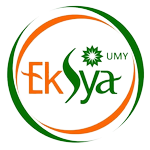Islamic Financing Effects on Small Medium Enterprises Competitiveness
DOI:
https://doi.org/10.18196/jiebr.v1i1.11753Keywords:
Competitiveness, Islamic Financing, SME, Innovative and loansAbstract
Islamic financing has been identified as an alternative to conventional financial services. However, the extent to which the Islamic financing model could drive small and medium enterprises' (SMEs) competitiveness has been a significant concern in the existing literature. Hence, this study investigates the impact of Islamic financing on SMEs' competitiveness. Adopting the survey research design, the study investigated 400 SME owners/managers in the Southern part of Nigeria. The study employed the ordinary least square regression in the analysis of data. The result establishes that Islamic finance is a significant driver of SMEs' competitiveness. The results specifically reveal that Islamic finance is critical in driving product price, customer experience, and quality of products. The practical implication of Islamic finance may reduce its operational cost since it comes at a no-interest rate while giving room for more innovative prices and customer-centric products at competitive prices. SMEs are to leverage on the opportunities provided by Islamic finance for them to adopt sustainable business practices
References
Adelekan, S. A. (2021). Islamic financing and entrepreneurship development: providing an alternative model for new venture growth. Finance, Management and Entrepreneurship (pp. 91-104). Olabisi Onabanjo University Press. ISBN: 978-978-992-374-8
Adams, B. S. (2020). The Influence of Islamic Financing on SMEs Performance in NigeriaInternational Journal of Research and Innovation in Social Science, 4(9),
Abdesamed, K. H., & Wahab, K. A. (2014). Financing of small and medium enterprises (SMEs): Determinants of bank loan application.8(17),717–727.https://doi.org/10.5897/AJBM2013.7222
Abosede, A.J., Obasan, K.A. and Alese, O.J. (2016). Strategic management and small and medium enterprises (SMEs) development: a review of literature. International Review of Management and Business Research, Vol. 5 No. 1, pp. 315-335.
Al-Jarhi, M.A. (2016). Islamic finance at crossroads. Presented at the 11th International Conference of Islamic Economics and Finance, Kuala Lumpur, October. Published in Intellectual Discourse, September 2017.
Alhabashi, K. (2015). Financing for small and medium enterprises : the role of Islamic financial institutions in Kuwait.
Aminu, I. M., & Shariff, M. N. M. (2014). Mediating Role Of Access to finance on the relationship between strategic orientation And SMEs Performance n Nigeria: A Proposed Research Framework. International Journal of Management Research & Review, 4(11), 1023–1035.
Anwar, M. (2018). Business model innovation and SMEs performance - Does competitive advantage me-diate? International Journal of Innovation Management, https://doi.org/10.1142/S1363919618500573
Asree, S., Zain, M. and Razalli, M.R. (2010), “Influence of leadership competencies and organizational culture on responsiveness and performance of firmsâ€, International Journal of Contemporary Hospitality Management, Vol. 22 No. 4, pp. 500-516.
Babajide, A. (2012). Effects of microfinance on micro and small enterprises (MSMEs) growth in Nigeria. Asian Economic and Financial Review, 2(3), 463–477
Barney, J., 1991. Firm Resources and Sustained Competitive Advantage. Journal of Management, 17(1), pp.99-120.
Batra, G., Kaufmann, D., & Stone, A. H. W. (2003). Investment climate around the world:
Voices of the Firms from the World Business Environment Survey. World Bank Publications
Bazza, M. I., & Daneji, B. A. (2014). Islamic financing : A panacea to small and medium scale enterprises financing problems in NIGERIA. 10(10), 432–444.
Buculescu, M. (2013). Harmonization process in defining small and medium-sized enterprises. Arguments for a quantitative definition versus a qualitative oneâ€, Theoretical and Applied Economics, 20(9), 103-114.
Chawla, S.K., Pullig, C. and Alexander, F.D. (1997), “Critical success factors from an organizational life cycle perspective: perceptions of small business owners from different business environmentsâ€, Journal of Business Entrepreneurship, 9(1), 47-58.
Diallo, A. T., & Gundogdu, A. S. (2021). Sustainable Development and Infrastructure: An Islamic Finance Perspective. Springer Nature.
Faisol, B. (2017). Islamic bank financing and it’s impact on small medium enterprise’s performance. ETIKONOMI 16(1), 21-33
Fraj, E., Matute, J. and Melero, I. (2015), “Environmental strategies and organizational competitiveness in the hotel industry: the role of learning and innovation as determinants of environmental successâ€, Tourism Management, Vol. 46, pp. 30-42.
Gibson, T. and van der Vaart, H.J. (2008), “Defining SMEs: a less imperfect way of defining small and medium enterprises in developing countriesâ€, Brookings, pp. 1-29.
Goldberg, A., Cohen, G. and Fiegenbaum, A. (2003), “Reputation building: small business strategies for successful venture developmentâ€, Journal of Small Business Management, Vol. 41 No. 2, pp. 168-186.
Hassan, M. K., Rabbani, M. R., & Abdulla, Y. (2021). Socioeconomic impact of COVID-19 in MENA region and the role of Islamic finance. International Journal of Islamic Economics and Finance (IJIEF), 4(1), 51-78.
Hoove, P. S., Sinbanda, K. & Pooe, D. (2014). The impact of corporate governance on firm competitiveness and performance of small and medium enterprises in South Africa: A case of small and medium enterprises in Vanderbijlpark. Mediterranean Journal of Social Sciences 5(15)
Hossain, M. and Kauranen, I. (2016), “Open innovation in SMEs: a systematic literature reviewâ€, Journal of Strategy and Management, Vol. 9 No. 1, pp. 58-73.
Kuzilwa, J. A. (2005). The Role of Credit for Small Business Success A Study of the National Entrepreneurship Development Fund in Tanzania. Journal of Entrepreneurship, 14(2), 131–161. https://doi.org/10.1177/097135570501400204
Lawson, B. (2012). Financial system strategy: Access to finance for SMEs. Financial System Strategy (FSS) 2020 International Conference, 1–21. Abuja: Central Bank of Nigeria.
Léon F. & Weill, L. (2016). Islamic Banking Development and Access to Credit," Working Papers of LaRGE Research Center 2016-02, Laboratoire de Recherche en Gestion et Economie (LaRGE), Université de Strasbourg.
Man, M. M. K. (2009). The Relationship between Innovativeness and the Performance of Small and Medium-size Enterprises (SMEs) of Malaysian Manufacturing sector. International Journal of Management and Innovation, 1(2), 1–14.
Man, T.W.Y., Lau, T. and Chan, K.F. (2002), “The competitiveness of small and medium enterprises A conceptualization with focus on entrepreneurial competenciesâ€, Journal of Business Venturing, Vol. 17 No. 2002, pp. 123-142.
McAdam, R., Reid, R. and Gibson, D. (2004), “Innovation and organisational size in Irish SMEs: an empirical studyâ€, International Journal of Innovation Management, Vol. 8 No. 2, pp. 147-165.
Mazanai, M., & Fatoki, O. (2012). Access to finance in the SME sector: A South African perspective. Asian Journal of Business Management, 4(1), 58–67.
Maiwada, B.Y., & Daneji, B.A. (2014). Islamic financing: A panacea to small and medium scale enterprises financing problems in Nigeria. European Scientific Journal, ESJ, 10.
Mohammed, U. D., & Obeleagu-Nzelibe, C. G. (2014). Entrepreneurial skills and profitability of Small and Medium Enterprises (SMEs): Resource acquisition strategies for new ventures in Nigeria. 25th International Business Research Conference, 1–21.
Octrina, F., & Mariam, A. G. S. (2021). Islamic Bank Efficiency in Indonesia: Stochastic Frontier Analysis. The Journal of Asian Finance, Economics, and Business, 8(1), 751-758.
Raza, H., Ahmed, F., Osama, A. and Ahmed, F. (2017), “Islamic banking for small and medium enterprises (SMEs): A glance at challenges and prospects in Pakistanâ€, International Journal of Development and Sustainability, 6(12), 1998-2008.
Sonita, E., Miswardi, M., & Nasfi, N. (2021). The role of Islamic higher education in improving sustainable economic development through Islamic entrepreneurial university. International Journal of Social and Management Studies, 2(2), 42-55.
Shah, S. A. A., Sukmana, R., & Fianto, B. A. (2021). Integration of Islamic bank specific risks and their impact on the portfolios of Islamic Banks. International Journal of Islamic and Middle Eastern Finance and Management.
Thomas, S., & Brycz, M. (2014). Nigeria Vision 20: 2020 Can Dream Become Reality? Evidence from National Accounts. Journal of International Studies, 7(3), 162–170.
Downloads
Published
How to Cite
Issue
Section
License
Copyright (c) 2021 Journal of Islamic Economic and Business Research

This work is licensed under a Creative Commons Attribution-NonCommercial 4.0 International License.
Journal of Islamic Economic and Business Research has CC-BY NC or an equivalent license as the optimal license for the publication, distribution, use, and reuse of scholarly work for non-commercial purpose. The non-commercial use of the article will be governed by the Creative Commons Attribution license as currently displayed on Creative Commons Attribution-NonCommercial 4.0 International License
Creative Commons License




